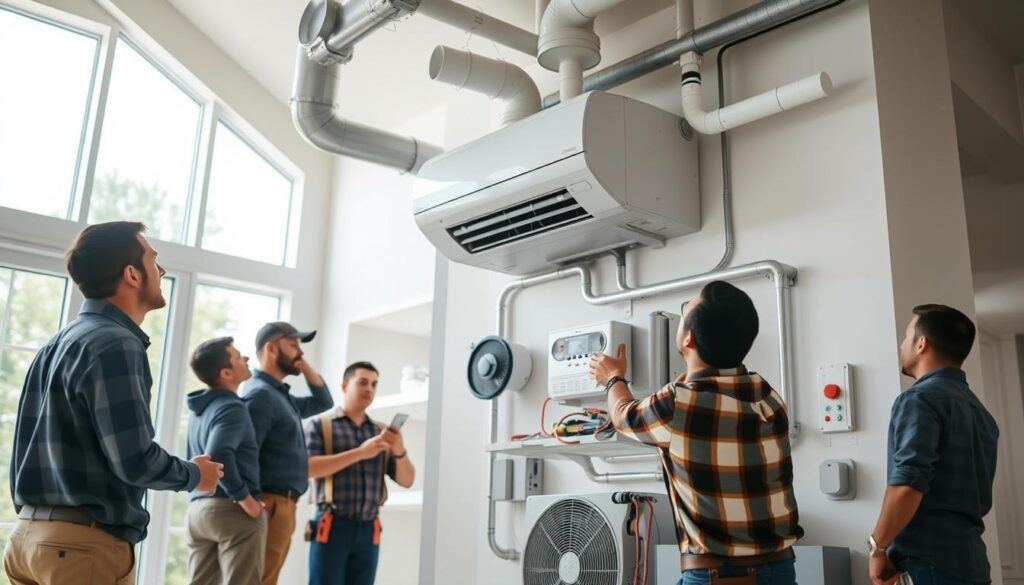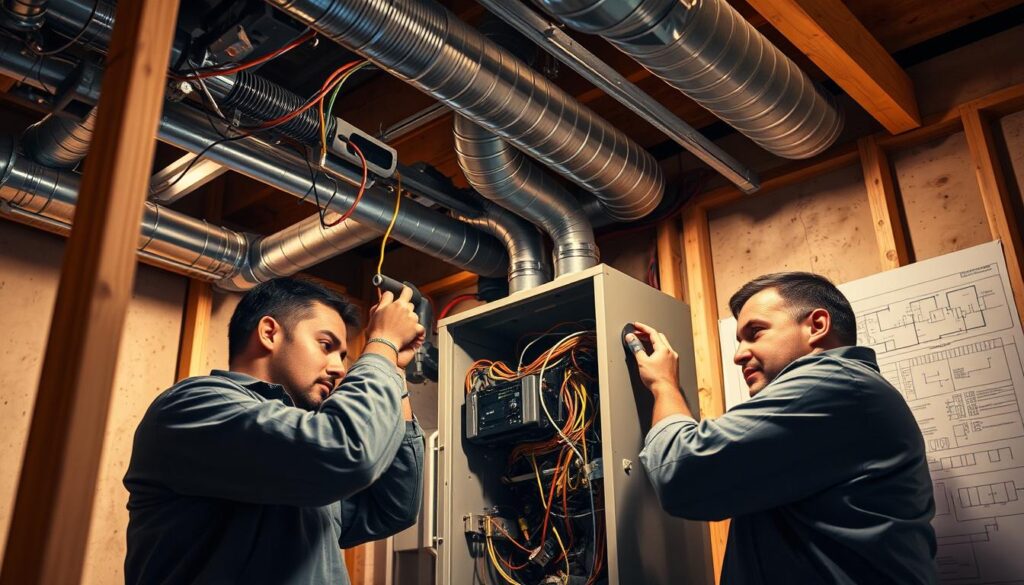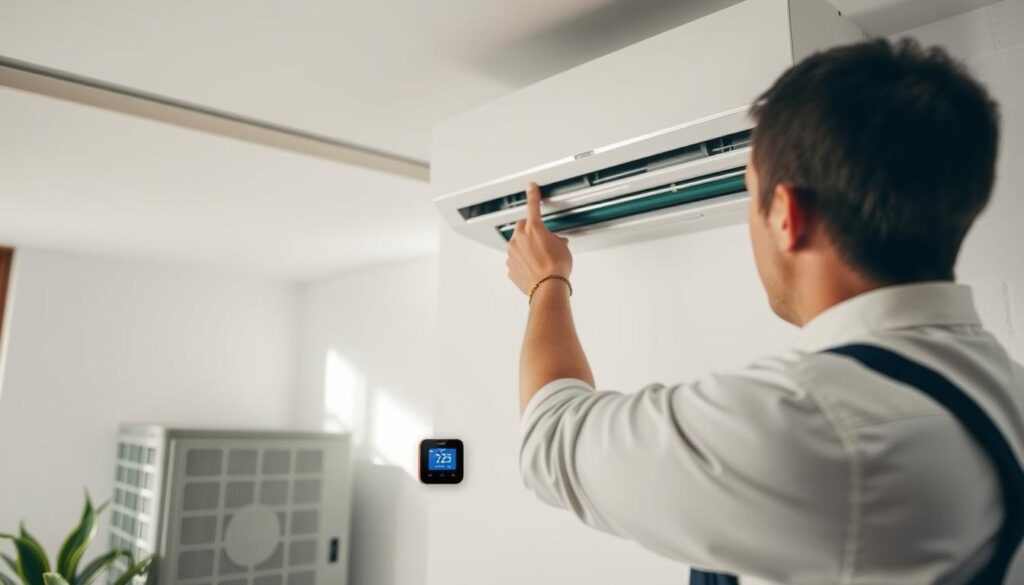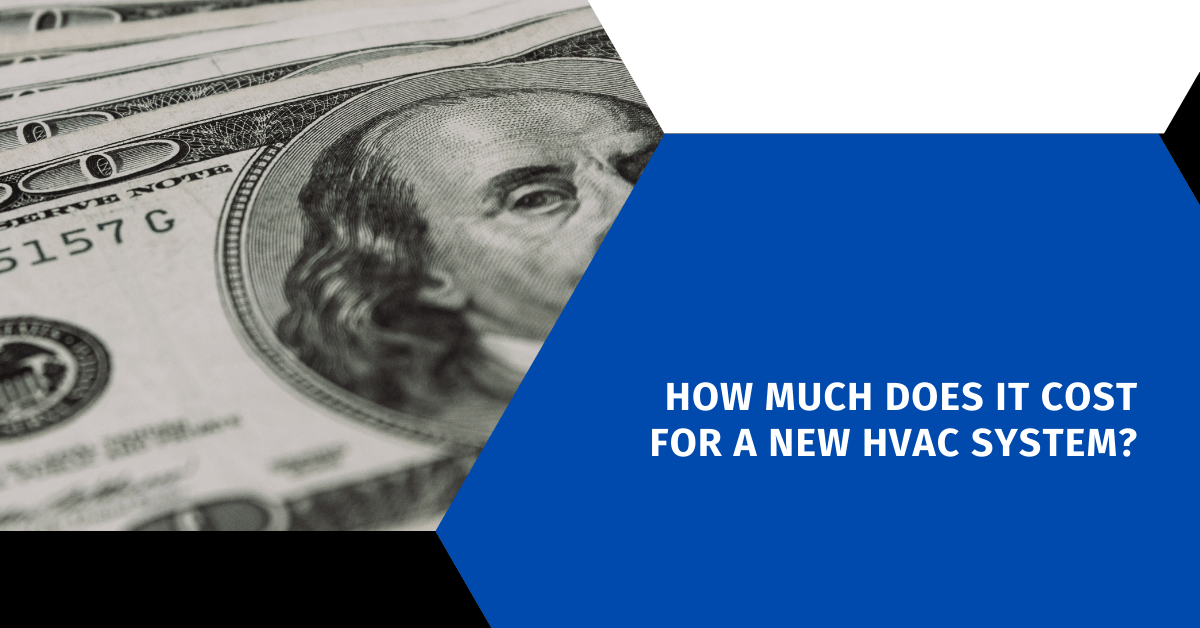Affiliate Disclosure
HVAC Guide Guys is a participant in the Amazon Services LLC Associates Program, an affiliate advertising program designed to provide a means for sites to earn advertising fees by advertising and linking to Amazon.
How Much Does It Cost for a New HVAC System? Are you curious about the cost of a new HVAC system? Knowing the true cost can help you invest wisely in your home’s comfort and energy savings.

Homeowners should expect to spend between $5,000 and $12,500 on a new HVAC system. The national average is about $7,500. But, the cost can change a lot based on several factors.
Things like your home’s size, the system’s complexity, and your local climate affect the price. Professional HVAC contractors can give you a detailed estimate based on your home’s needs.
Key Takeaways
- Average HVAC system cost ranges from $5,000 to $12,500
- National average installation price is approximately $7,500
- Costs depend on home size and system complexity
- Professional assessment is recommended for accurate pricing
- Energy efficiency can impact long-term system expenses
Table of Contents
Understanding HVAC System Basics
Your home’s comfort relies on a complex network of heating, ventilation, and air conditioning (HVAC) systems. Knowing the basics of these systems helps you make smart choices about new hvac unit price and hvac replacement cost.
An HVAC system is more than one machine. It’s a complex network of parts working together. They control your home’s temperature, humidity, and air quality.
Core Components of an HVAC System
- Heating unit (furnace or heat pump)
- Cooling unit (air conditioner)
- Ductwork for air distribution
- Thermostat for temperature control
- Air filters for cleaning circulated air
Types of HVAC Systems
Different homes need different HVAC solutions. Here are the most common types:
| System Type | Key Features | Best For |
|---|---|---|
| Central Air Conditioning | Whole-home cooling | Larger homes with existing ductwork |
| Heat Pump | Heating and cooling capabilities | Moderate climates |
| Ductless Mini-Split | Zone-based temperature control | Homes without ductwork |
Importance of Professional Installation
Proper HVAC installation is key for system efficiency. A poorly installed system can increase your hvac replacement cost by up to 30%. Professional technicians ensure your system works well, saves energy, and lasts longer.
Choosing the right HVAC system depends on your home’s size, climate, and comfort needs. Talking to a professional helps you find the best fit for your budget and comfort.
Explore Our HVAC Shop
Looking for top-rated HVAC tools, parts, and accessories? Visit our shop and find the perfect solution for your needs.
Visit the ShopAverage HVAC System Costs
Planning for a new HVAC system? Knowing the current prices is key. In 2024, expect to spend between $5,000 and $11,000 for a standard system. Your quotes will change based on several important factors.
The cost of your HVAC system depends on several things. The size of your home, system efficiency, and the brand you choose all matter. Remember, every home is different, so your pricing guide should be flexible.
- Basic system replacement: $5,000 – $7,000
- Mid-range system installation: $7,000 – $9,000
- High-end system with advanced features: $9,000 – $11,000
Different HVAC systems have different prices. For homes, you might need a small unit or a big system, depending on your space.
| System Type | Average Cost Range | Efficiency Rating |
|---|---|---|
| Split System AC | $3,500 – $7,500 | 14-16 SEER |
| Heat Pump | $4,000 – $8,500 | 15-20 SEER |
| Ductless Mini-Split | $2,500 – $6,000 | 16-22 SEER |
Pro tip: Always get multiple hvac system quotes to compare pricing and ensure you’re getting the best value for your investment.
How Much Does It Cost for a New HVAC System by Type
When looking for affordable HVAC systems, knowing the cost of different types is key. Your estimates will change based on the system you pick. Let’s look at the prices for common HVAC systems.
Air Conditioning Units and Installation
Air conditioning systems vary in size and price. Window units are the cheapest, costing $150 to $500. Central air systems, for full home cooling, cost between $1,900 and $5,500.
- Window units: $150 – $500
- Central air systems: $1,900 – $5,500
- Ductless mini-split systems: $2,000 – $4,500
Furnace Systems and Costs
Furnace prices vary by fuel type and efficiency. Electric furnaces are cheaper, costing $1,600 to $6,900. Oil furnaces are more expensive, costing $6,750 to $10,000.
| Furnace Type | Cost Range | Average Efficiency |
|---|---|---|
| Electric Furnace | $1,600 – $6,900 | 95-100% |
| Gas Furnace | $2,300 – $5,500 | 80-98% |
| Oil Furnace | $6,750 – $10,000 | 80-90% |
Heat Pump Installation Expenses
Heat pumps offer both heating and cooling. Air source heat pumps are common, costing $4,500 to $8,000 to install. Geothermal heat pumps are more efficient but cost more upfront.
Pro tip: Think about your local climate and energy savings over time when choosing an HVAC system.
Keep in mind, these prices are estimates. Your actual costs will depend on your home’s size, local labor rates, and system complexity.
Explore Our HVAC Shop
Looking for top-rated HVAC tools, parts, and accessories? Visit our shop and find the perfect solution for your needs.
Visit the ShopFactors That Influence HVAC Installation Costs
Knowing what affects HVAC costs can help you choose the right heating and cooling for your home. Several important factors can change the cost of installing an HVAC system.
Your home’s size and layout are key in determining HVAC costs. Here are the main factors:
- Home Size and Layout: Bigger homes need stronger systems, which raises costs
- Existing Ductwork Condition: Fixing or replacing ducts can greatly affect costs
- Energy Efficiency Ratings (SEER): Better systems cost more but save money in the long run
- System Type and Complexity: Different setups affect the price of installation
The brand and quality of your equipment matter a lot. High-end brands offer better tech and warranties. This might raise the initial cost but could lower maintenance costs later.
Labor costs vary by area and the contractor’s skill. Complex jobs or homes needing big changes will cost more. Getting a professional to assess your needs helps get a precise estimate for your home.
Pro tip: Always get multiple quotes and consider long-term energy efficiency when evaluating HVAC system investments.
Cost of Additional HVAC Components and Accessories
When planning your new hvac unit price strategy, think about extra components. These can make your home more comfortable and energy-efficient. Accessories like these can improve your home’s performance and air quality, changing your living space.
Expanding your hvac pricing guide should include several key accessories. These can greatly improve your home’s climate control:
- Smart Thermostats and Controls
- Air Purification Systems
- Humidity Control Solutions
Smart Thermostats: Intelligent Climate Management
Modern smart thermostats offer precise temperature control and save energy. Prices range from $120 to $260, based on features and compatibility. These devices provide:
- Remote temperature monitoring
- Energy usage tracking
- Automated scheduling
- Integration with smart home systems
Air Purification for Healthier Indoor Environments
Whole-house air purifiers are key for better air quality. They cost between $500 to $1,500. These systems remove:
- Dust and allergens
- Microscopic pollutants
- Potential airborne pathogens
Humidity Control: Balanced Home Comfort
Whole-house dehumidifiers manage moisture well, costing $1,300 to $2,800. Proper humidity control prevents mold growth, reduces allergens, and makes your home more comfortable.
Choosing the right HVAC components can make your home more efficient, comfortable, and healthy. It can also lower your energy costs over time.
Explore Our HVAC Shop
Looking for top-rated HVAC tools, parts, and accessories? Visit our shop and find the perfect solution for your needs.
Visit the ShopInstallation and Labor Costs Breakdown

When planning to replace your residential HVAC system, knowing the costs is key. Labor usually makes up 40-50% of the total cost. This is a big part of what you’ll spend.
Several things affect the cost of installing a new HVAC system:
- How complex the installation is
- How easy it is to get to your home
- The cost of labor in your area
- The type and size of the system you need
- Any permits or inspections needed
Professional HVAC techs charge differently based on where you live and the project details. Cities usually cost more than rural areas.
| Installation Factor | Cost Impact |
|---|---|
| Standard Residential Installation | $1,500 – $3,500 |
| Complex Installation | $3,500 – $7,000 |
| Permit Fees | $100 – $500 |
To save on costs, plan your installation for off-peak times. Getting quotes from different companies and understanding labor costs can help you choose wisely.
Financing Options for HVAC System Replacement
Replacing your HVAC system is a big deal. Luckily, there are many ways to make it more affordable. Knowing your options can make getting quotes easier and less stressful.
When looking into financing for your HVAC replacement, you have several choices:
- Home Equity Loans: Use your home’s value to get low-interest financing
- Personal Loans: Get funds quickly with possibly shorter repayment terms
- HVAC Company Installment Plans: Get financing directly from your installer
- Home Equity Lines of Credit (HELOCs): A flexible borrowing option with lower rates
Each financing option has its own benefits. Home equity loans often have lower rates because they’re secured by your property. Personal loans are quicker to get but might have higher rates. Many HVAC companies also offer special financing plans to help make systems more affordable.
Before picking a financing option, think about these important things:
- Your current credit score
- The interest rates available
- The length of your repayment
- Any tax implications
Looking at hvac system quotes from different providers can help you find the best deal for your home’s comfort.
Explore Our HVAC Shop
Looking for top-rated HVAC tools, parts, and accessories? Visit our shop and find the perfect solution for your needs.
Visit the ShopWays to Save on HVAC Installation
Getting affordable HVAC systems doesn’t have to cost a lot. Smart homeowners can cut down on hvac unit estimates and installation costs. By using smart cost-saving tips, you can get the most out of your investment and keep your home comfortable.

Strategic Purchase Timing
When you buy your HVAC system is important for saving money. Here are some tips for buying on a budget:
- Buy in the off-peak seasons like fall or early spring
- Stay away from summer and winter when prices are high
- Look for deals when contractors are slow
Rebates and Incentive Programs
Utility companies and governments offer money back for energy-saving HVAC upgrades. Check out these ways to save:
- Federal tax credits for energy-efficient systems
- State rebate programs
- Local utility company incentives
| Incentive Type | Potential Savings |
|---|---|
| Federal Tax Credits | Up to $500 |
| State Rebates | $100-$300 |
| Utility Incentives | $50-$250 |
Maintenance Tips to Extend System Life
Regular maintenance can save you from expensive repairs and extend your HVAC’s life. Proactive care is key to long-term savings. Here are important maintenance steps:
- Change air filters every 3-6 months
- Get annual professional checks
- Keep outdoor units clean and clear
- Seal and insulate ductwork
By using these tips, you can lower your HVAC costs and keep your home comfortable and energy-efficient.
Conclusion
Figuring out the cost of a new HVAC system is more than just the price. It’s about long-term comfort, energy savings, and home performance. Look at different systems, installation needs, and energy savings to make a smart choice.
When looking at HVAC replacement costs, quality and installation are key. Research brands, compare ratings, and get quotes from certified pros. Aim for a system that balances cost with energy savings and reliability.
Energy efficiency is critical when picking a new HVAC system. Modern systems with high SEER ratings can cut down on utility bills. This can make up for the higher initial cost. Working with HVAC experts can improve your home’s comfort and energy use.
Choosing an HVAC system should be a thorough process. Consider the purchase price, rebates, maintenance, and lifespan. Smart homeowners see a new HVAC system as an investment in comfort, energy, and property value.

